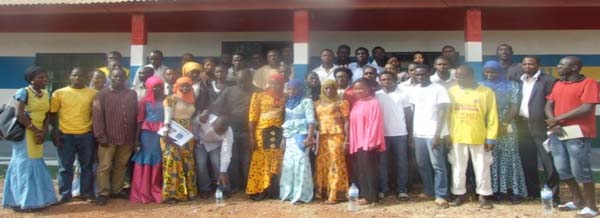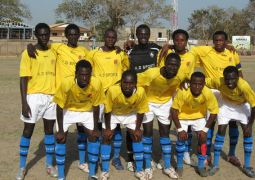
The training, dubbed the Rural Entrepreneurial Venture Creation and Experimental Learning (REVCEL), was organised as part of Creating Opportunities for Rural Youth (CORY) Gambia project.
It is being implemented by the Global Youth Innovation Network (GYIN) - Gambia chapter.
The training, from 11 to 22 December, is meant to equip young men and women with entrepreneurship skills, focusing on project and enterprise development.
Underway at the Trans-Gambia Lodge in Pakalinding, the event was jointly funded by CORY Gambia project and the National Agricultural Land and Water Management Development Project (NEMA).It was officially opened on 14 December 2015.
A similar REVCEL training on entrepreneurship for 50 youths is simultaneously underway in the North Bank Region town of Farafenni.It was also organised as part of the CORY Gambia project, an initiative that supports young rural women and men in West and Central Africa to become entrepreneurs.
This is the third batch being trained by CORY.The first ever REVCEL training was conducted in July 2015 for 25 youths in Central River Region south.This was followed by the second one which was attended by 54 rural youth – 27 in URR and another 27 in CRR north.
Speaking at the opening of the latest training in Pakalinding on Monday, CORY Gambia project coordinator, Mamadou Edrisa Njie, said the project has three components.
The first one is research and share learning that will support the scaling up and replication of successful youth-led venture creation and business development for rural youth.
The second component is to build the capacity of rural youth organisations to develop and deliver entrepreneurial innovation-based experimental training, mentorship, and advisory, and partnership services to support youth employees, and entrepreneurs in rural areas of WCA.
The other component is to build the capacity of local financial institutions to provide micro-credit through risk assessment and mitigation.This component also includes the development of youth-inclusive financial instruments in rural areas of Benin, Cameroon, The Gambia, and Nigeria.
Mr Njie said all the three initiatives are geared towards uplifting the entrepreneurial spirit of the young people who are the future leaders of the country.
He said the project is currently implementing the second component by building the capacity of rural youth organisations on entrepreneurship innovation.
Mariam Saine-Sanyang, GYIN Gambia financial controller, said at the end of the 12-day training, the participants would be able to create their own venture or startup a business.
She said the project through which the training is conducted is aimed at contributing to the reduction of poverty in the rural regions and to empower the young people to have a better livelihood.
“Therefore, I would challenge you [the participants] to take this training seriously so as to be able to replicate the knowledge gained,” she said.“Upon completion of this training, each of the participants is required to conduct a step-down training for four rural youths within his/her area.”
Banky Njie, business development officer of the Nema project, said The Gambia government and its partners like the International Fund for Agricultural Development deemed it necessary to support training opportunities for young people.
He said that during the course of the training, the participants will appreciate the important role that business development can play in enhancing entrepreneurship skills to integrate into the agricultural value chain.
“It will also provide an opportunity to share experiences on successful enterprises that have transformed smallholder agriculture into profitable businesses that can contribute to generating employment and the creation of wealth, thereby reducing poverty,” Mr Njie said.
“It is highly expected that this entrepreneurship training will provide you with the pre-requisite business knowledge and skills for a better understanding in preparing for your business and its operation,” he added.
Mr Njie said there are opportunities abound to transform the activities of youth to increase production, not only to feed the nation, but also feed the world.
“There is therefore a pressing need to change the image of agriculture. We have to rebrand agriculture, together,” he said. “I am confident that this training will prepare you for this crusade of commercialising your activities to feed our nation and the world.”
Momodou L. Fofana, a representative of the Ministry of Youth and Sports (MoYS), said the ministry is committed to the development and empowerment of Gambian youth through skills development, especially entrepreneurial skills.
He said several Gambian youth have been supported by The Gambia government through MoYS to undergo months of entrepreneurship skills training at the Songhai Centre in Benin.
Mr Fofana said, in addition, through the National Enterprise Development Initiative (NEDI) has been providing training and loans to young men and women of The Gambia to support their business ventures.
He pointed out that if all projects go out to empower the young people, like CORY, the future of The Gambia will be bright.
Alasana Sanneh, a representative of the governor of LRR, said the government is putting all its efforts for the country to achieve its development goals, especially the Vision 2016 Food Self-Sufficiency Agenda.
He said it is important to build the capacity of the youth so that the country can be developed as expected.
The CORY project is being implemented in four countries - The Gambia, Nigeria, Cameroon and Benin for the period of three years.It is focused on young men and women between the ages of 18-35 years who are involved in agricultural production and activities associated with rural markets.
The project targets rural youth institutions for business training, advocacy, networking and knowledge exchange all with a 1:1 female to male ratio.


